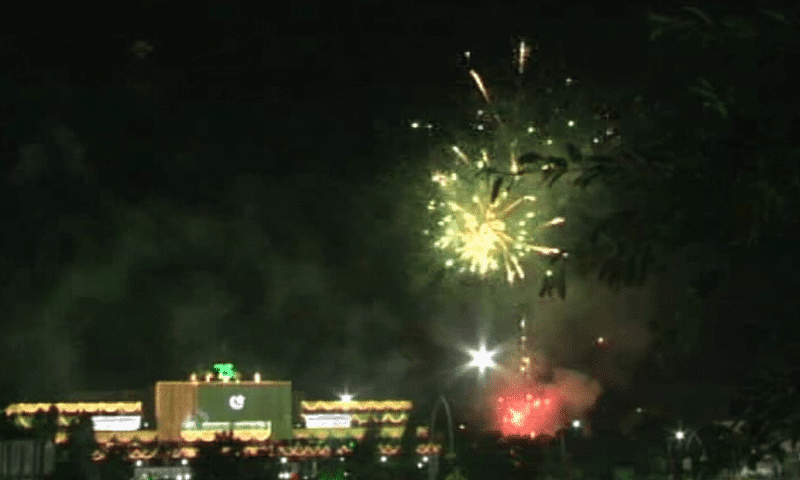‘WELL left’ is a term used in cricket when a batter judges the line and length of a potentially problematic ball correctly and, rather than taking the risk of playing it, covers up and, bat high in the air, lets it go harmlessly through to the wicket-keeper’s gloves.
The moral of the story is that you don’t have to swing at every ball, especially the ones that are swinging and can take an edge and get you into trouble, even get you caught out. Evidently, the concept is alien to Pakistani politicians who have to have a go at every ball.
The result: they make fools of themselves. The most recent example of this is the reaction to tweets calling for Imran Khan’s release by Richard Grenell, a former acting director of national intelligence and ambassador to Germany in the last Trump administration, who has been named by president-elect Donald Trump as a presidential envoy for special missions.
Having ceded a walkover to the PTI in narrative-building within the country and effective lobbying abroad, many PML-N politicians took it upon themselves to respond to the Trump aide on social media with details of their own persecution whilst Imran Khan was in power.
If they had any sense, they’d get professionals to run their narrative-building in the US.
If they thought the detractor would reach for a box of tissues, they were dead wrong. Their responses, which fuelled more tweets by the American political figure, betrayed their utter and complete failure in understanding the system of lobbying and funding of politicians seeking public office in the US.
If this is how the hybrid set-up aims to respond to challenges emerging from the new American president taking office in less than a month’s time, then the fate of their narrative will be no different abroad to the lost battle at home.
If they had any sense, they’d get professionals with expertise and a track record in the US to run their narrative-building in that country, as they seem to care deeply about perceptions in Washington. A far less damaging option than mounting an ill-informed defence on social media would be to stay silent till such time as the challenge comes via official channels and relates to the specifics.
In Pakistan, a solidly assembled narrative can be, and is being, countered with state oppression. Even if people don’t believe you, they have been browbeaten into near submission and, therefore, the success of their narrative will have to wait till the next electoral round to manifest itself. Taking a sledgehammer to the task, does not work beyond your coercive reach.
Perhaps, the only entity in the world which has long lost the narratives war around the world but goes on relentlessly, as if that loss was no more than a minor inconvenience, is the State of Israel which has a free pass to carry out a genocide in full public view in the 21st century and yet not have to pause.
Not just that. Any and every conscientious objection to this mass murder is dubbed antisemitic. But the apartheid state’s effective lobbying, funding of public officials’ election campaigns, and media control delivers it the sort of impunity that is rarely evidenced elsewhere. This in addition to historical reasons, of course.
Perhaps, someone in government should examine how groups such as the American Israel Public Affairs Committee (Aipac) in the US, and similarly in the UK the Labour Friends of Israel and Conservative Friends of Israel to quote just two examples, operate, and the decisive influence they exert on policymakers and policies in the two countries.
Overseas Pakistanis, especially in the US who support the PTI, have a very good understanding of how the wheels of power turn in that country and know well that those who grease them with campaign funds will always have a sympathetic ear in the corridors of power.
This is not to say that their influence rivals, or comes anywhere near, that of Aipac for one. Even then, as is being seen, they enjoy far more influence with the incoming US administration than the hybrid government does and this may be a factor that could come into play in the coming months.
At the same time, it would be important to see things in their proper context. The incoming administration will have China’s growing power and influence, the Russia-Ukraine war, and the Middle East conflict between the Israelis and the Palestinians to deal with first.
In line with how the US wants to shape the Middle East, it will push for further progress on developments such as the Abraham Accords and try and persuade Saudi Arabia to join the UAE and others who have ‘normalised’ relations with Israel.
For now, at least Saudi Arabia has made its normalisation conditional on a ‘two-state solution’. Whether Riyadh will have enough leverage with Washington to have its voice heard is not clear, particularly when Israel has rejected any such solution and also embarked on its Greater Israel plan with additional land grabs in Syria and Lebanon in the first phase.
Iran will be in America’s and its key ally in the region Israel’s crosshairs, especially Tehran’s nuclear and missile programme. Viewed against this backdrop, Pakistani politics and what is happening within the country may merit more than a statement every now and then to reflect the lobbyists’ efforts. Nonetheless, Trump’s unpredictability will remain a source for anxiety in Islamabad.
On the other hand, for years and years, Pakistan’s relations with the US have been dictated by the relations between the Pentagon and GHQ and are likely to remain that way for the foreseeable future. Pentagon spokesman Maj-Gen Pat Ryder’s tone, tenor and substance was in stark contrast to US presidential deputy security adviser Jon Finer’s bizarre claim about Pakistan’s missile programme.
Therefore, Pakistani politicians would be well-advised to learn the merits of a ‘well left’ policy rather than hang their bats out when they have no idea what the ball will do. That would be a safe and prudent thing to do.
The writer is a former editor of Dawn.
Published in Dawn, December 29th, 2024





Leave a Reply